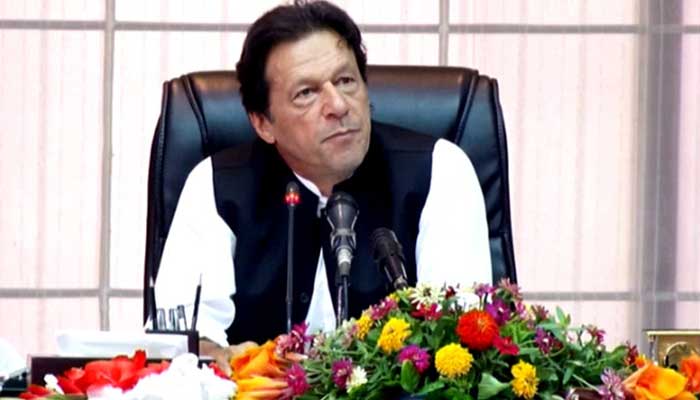Civil service reforms: Imran’s dream faces resistance from within cabinet
In the mid last month, the first civil service reform proposal, prepared by the task force led by Dr Ishrat Husain, was presented before the federal cabinet but it could not get the approval of the top-most decision-making body of the country.
ISLAMABAD: Four months have passed but Imran Khan's government has not yet approved for implementation even a single reform relating to civil services and police amid reports that the only proposal (pertaining to security of tenure for federal secretaries), so far presented before the cabinet, faces opposition from within the PTI regime.
Informed sources said that Prime Minister Imran Khan is desirous of implementing PTI’s agenda of civil service reforms, including its depoliticisation, but he does not have complete support of his ministers, some of whom insist that security of tenure would mean making bureaucrats more powerful than even their political bosses.
In the mid last month, the first civil service reform proposal, prepared by the task force led by Dr Ishrat Husain, was presented before the federal cabinet but it could not get the approval of the top-most decision-making body of the country.
The proposal, pertaining to the procedure of federal secretaries’ appointment and security of their tenure, was referred to a ministerial committee following some strong opposition voices within the cabinet against this proposal.
Despite the lapse of almost six weeks, the proposal has not been cleared by the ministerial committee amid reports that even there is opposition within the ministerial committee to give security of tenure to federal secretaries.
A committee of three top bureaucratic aides of the prime minister - Cabinet Secretary, Establishment Secretary and Principal Secretary to the PM - was recommended to be constituted to suggest to the premier a panel of three most suitable officers for the appointment of every federal secretary. The premier, according to the proposal, could appoint any of the three officers recommended for any post of federal secretary by the committee.
However, in case the prime minister does not find any officer included in the panel fit for the post, the committee would recommend a new panel. The reform proposal does not give the PM the authority to appoint on his own any officer as secretary of any ministry or division as is the case now.
Once the prime minister appoints secretary of a division, it was proposed, the officer will be considered on probation for six months and during this period, the secretary could be removed or changed. However, after the completion of six-month probation period, the secretary will have the protection of compete three-year tenure.
Once the officer has been selected through this process, he/she should not be transferred until the completion of the tenure i.e. three years, according to the reform proposal. However, in cases where a disciplinary action is initiated against the officer for corruption, negligence of duties, insubordination, misconduct or failure to meet the performance targets assigned to him/her etc and evidence has been established, the prime minister can decide that the officer should be moved out of the office before completing the posting tenure. While making such transfers, reasons must be written on the file.
This was the first proposal of Dr Ishrat Husain but it could not get the approval of the cabinet. Security of tenure is considered pivotal as one of the most important problems facing bureaucracy is the frequent transfer of civil servants. It undermines service delivery because managers are often not able to stay in place enough to institute or sustain reforms.
It is said that important initiatives of the government and the policies, programmes and projects could not be implemented within the stipulated time or within the projected cost because of the lack of continuity in the tenures of key civil servants.
-
 Courtney Love Makes First Appearance Since New Report On Kurt Cobain's Death
Courtney Love Makes First Appearance Since New Report On Kurt Cobain's Death -
 King Charles Anxious As Uncertainty Grows Over Sarah Ferguson’s Next Move
King Charles Anxious As Uncertainty Grows Over Sarah Ferguson’s Next Move -
 Real Reason Kim Kardashian Is Dating Lewis Hamilton
Real Reason Kim Kardashian Is Dating Lewis Hamilton -
 Rihanna Leaves Elderly Woman Star-struck In Viral Grocery Store Video
Rihanna Leaves Elderly Woman Star-struck In Viral Grocery Store Video -
 TikTok US Launches Local Feed Using Precise Location Data
TikTok US Launches Local Feed Using Precise Location Data -
 Jill Biden’s Former Husband Charged With Wife’s Murder
Jill Biden’s Former Husband Charged With Wife’s Murder -
 Zayn Malik Reveals Parenting Decision Gigi Hadid Criticized Him Over
Zayn Malik Reveals Parenting Decision Gigi Hadid Criticized Him Over -
 Palace Releases Prince William's Photos From Final Day Of His Saudi Arabia Visit
Palace Releases Prince William's Photos From Final Day Of His Saudi Arabia Visit -
 Microsoft Warns Of AI Double Agents As Enterprise Adoption Of AI Agents Surges
Microsoft Warns Of AI Double Agents As Enterprise Adoption Of AI Agents Surges -
 Kate Middleton, Prince William Break Silence Over Tragic Shooting In Canada
Kate Middleton, Prince William Break Silence Over Tragic Shooting In Canada -
 'Finding Her Edge' Star Madelyn Keys Explains Adriana's Remarks About Brayden Romance
'Finding Her Edge' Star Madelyn Keys Explains Adriana's Remarks About Brayden Romance -
 Royal Expert Raises Questions Over Sarah Ferguson's 'plotting' Stunning Comeback
Royal Expert Raises Questions Over Sarah Ferguson's 'plotting' Stunning Comeback -
 Instagram Develops AI ‘Create My Likeness’ Tool To Generate Personalised Photos And Videos
Instagram Develops AI ‘Create My Likeness’ Tool To Generate Personalised Photos And Videos -
 Meghan Markle, Prince Harry Friends Suggest Their Marriage 'isn't All It Seems'
Meghan Markle, Prince Harry Friends Suggest Their Marriage 'isn't All It Seems' -
 Andrew Handed Out 'classified' Information To Jeffrey Epstein
Andrew Handed Out 'classified' Information To Jeffrey Epstein -
 Margot Robbie Recalls Wild Party Days And Getting Kicked Out Of Clubs
Margot Robbie Recalls Wild Party Days And Getting Kicked Out Of Clubs




